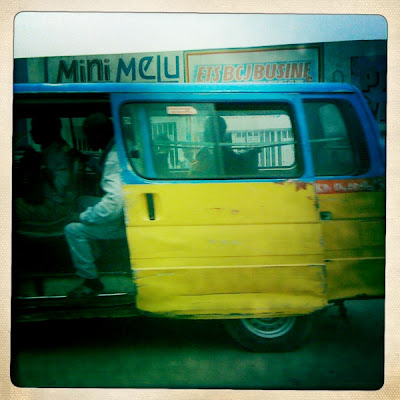Lightening, thunder, torrential rain.
Mama Vida walked for hours through this deluge in order to come to work. She arrived on our doorstep around 10am after having left her house in Bandal at 5:30am.
Getting to work in Kinshasa for the majority of workers is never a picnic. The transport system is complicated and crowded and slow. Mama Vida usually travels around 1.5 hours to get to work on a good morning. She switches transport 3-4 times, sometimes more. This whole process costs her around $3-$4. Which is incredible considering that for many, $5/day is an acceptable wage in this city.
And, this is what I mean when I talk about "transport":
The problem this morning was bigger than rain. A transport strike was the source of most of the woe. The rain just made the woe more miserable. Strikes don't actually happen all that often in Kinshasa. Mainly because no one can possibly go a day without money. Mama Vida explained simply, "The taxi drivers have to eat too." No money, no food.
Per the government, the transport buses, cars, and vans are supposed to carry insurance. But the insurance is prohibitively expensive, which means no one actually has insurance. But no one has driver's licenses either.
However, in recent days, the police are deciding to enforce this government rule more actively. Why? Part of it may be because the police make about $50/month (remember when I said the $5/day was a "good wage"?). And so, the opportunity to raid a transport driver (who, of course, does not carry insurance) and vehicle in the name of the law is a tempting option. A quote from a press release from an opposition website states:
Tired of being victims of bullying, batons, harassment brigade road, drivers are on strike for three days.
Mama Vida said there has been talk of a strike, but "nobody thought it would actually happen." Then, last night, an unofficial announcement was made and the strike was on. Which meant that some 5-7 million + people walked many kilometers to work this morning in a torrential downpour.
The DRC government doesn't run the majority of the transport system. It's all private drivers and cars and Deux Cent Sept's (the ubiquitous old Mercedes buses), helping the massive city of Kinshasa get to work each day. There have been big unrealized plans for a wonderful public transport system in the works for years now. I found a fascinating specific conversation about this topic here. Apparently, this is what Kinshasa 2025 will look like:
Apparently, a lot like Portland.
The weirdest thing is that while everyone who relies on transport everyday is talking of nothing else, the reliable news sources are quiet on the topic. Even Twitter, which is usually abuzz with such things when the news outlets haven't picked up a story, is only carrying the opposition announcements. My friend, Bettie, who works with me, wasn't sure what to make of that. She said that they were told to listen to Radio Okapi today for news, but nothing so far.
Bettie is nervous about the return trip home today after work. On the way here, she hitched a ride with a private car trying to make an opportunistic profit out of this situation. When striking taxi drivers saw the packed car, they surrounded it, shaking it violently. They then opened the doors and threw the passengers out. Including Bettie. (Interestingly, she was laughing hysterically while telling this story. What else to do?) In Masina and Ndjili, Bettie heard that anyone offering rides to paying passengers was facing much worse: beating and vehicle burning. However, she agreed with Mama Vida that "this can't last long. They must eat too."
Our kids are going to be pleased, as I think this means that Mama Vida will be camping out at our place until things become more manageable. And by manageable, I mean this:
 |
| Emboutiage. |
Last minute update: Radio Okapi just posted a story on this topic (at around 1pm our time).
The streets of Kinshasa, the DRC capital, teeming with people on Monday 21 May in the morning. This megalopolis of about 9 million people has no business transit viable. With the strike by holding private sector monopoly, the city seems paralyzed. The drivers are protesting against vehicle controls intensified in recent days by different specialized services of the city. City Train and Stucco (Urban Transport Company of the Congo), two carriers, do exist in Kinshasa. But both are almost at a standstill.The public transport company City Train had approved one hundred fifteen (115) new buses in 2008. There are no more than twenty that are still circulating. In the concession company located in the town of Limete, more than eighty bus tires without rims are immobilized.Train City officials say these vehicles are missing only "accessories" and Tyre. Their engines are in "perfect condition", they said, dismissing the charge of mismanagement that some people put in their charge. They argue against that by "a company has more than enough subsidies from the state."
I also just talked to a guy in my office with a slightly different perspective. He told me the same basic story as Bettie and Mama Vida, but added that lots of "regular people" are afraid of the taxi drivers because they cause lots of dangerous accidents. He has some hope that the government will "discipline" the drivers into better, safer behavior.
Alas, I am reminded that every story has many angles.









No comments:
Post a Comment